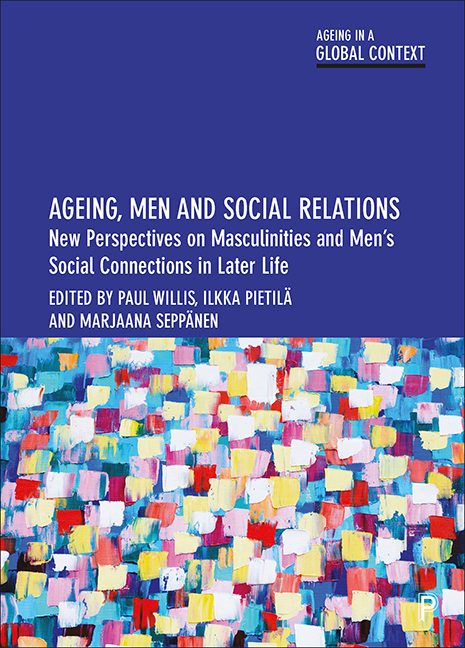 Ageing, Men and Social Relations
Ageing, Men and Social Relations Book contents
14 - Future directions in studies of ageing, men and social relations
Published online by Cambridge University Press: 18 January 2024
Summary
The chapters within this volume have approached older men’s social relations from different angles. What binds them together, alongside social relationships, is their focus on ageing and old age as a life stage, on the one hand, and on masculinities as sets of cultural norms, ideals and expectations that guide men’s behaviour in various everyday settings on the other. The chapters come from several continents and different cultural and political backgrounds. In this concluding chapter we take a broader look at the chapters both in terms of variety and similarity, and change and continuity in how various cultural and societal factors shape older men’s social relations. The diversity of authors’ cultural and scientific backgrounds also gives us a chance to consider to what extent the everyday thinking about older men and their social relations corresponds to men’s lived experiences.
There are three themes we reflect on in this chapter (based on the authors’ contributions). The first one is how individual transitions and wider social changes shape men’s expression and performance of masculinities in later life. The second theme to be discussed is the ways age relations and ageism shape men’s social relations with intimate partners, family, friends and wider community connections. Finally, we reflect on issues connected to intersectionalities: in what ways does the intersection between ageing and masculinities, in conjunction with other social axes, enhance or diminish men’s social wellbeing and sources of social support in old age? In doing so we return to the critical questions we posed in Chapter 1 before identifying future directions for research and scholarship in this arena.
Masculinities in later life: individual transitions and social change
The contributions in this volume have discussed widely the changing nature of masculinities, various cultural and societal processes behind the changes, and the potential effects that changes in masculinities have on men’s social bonds and supportive ties in later life. Masculinities have changed over time and these changes reframe men’s social relations. However, change and continuity are present at the same time, which was apparent in analysis (Kong, Chapter 3) addressing the ways in which two generations accomplish gay masculinities against changing Chinese masculine ideals.
- Type
- Chapter
- Information
- Ageing, Men and Social RelationsNew Perspectives on Masculinities and Men's Social Connections in Later Life, pp. 218 - 224Publisher: Bristol University PressPrint publication year: 2023
